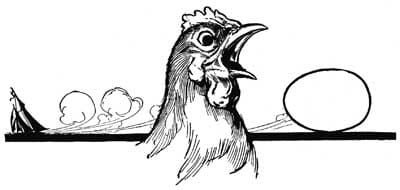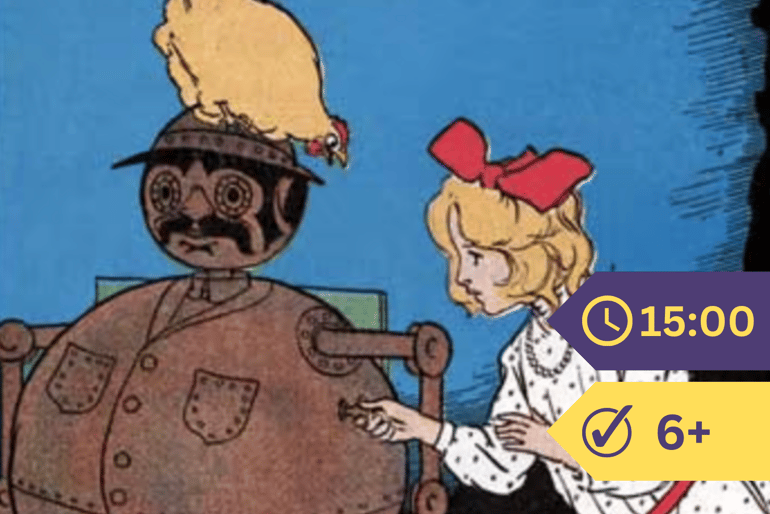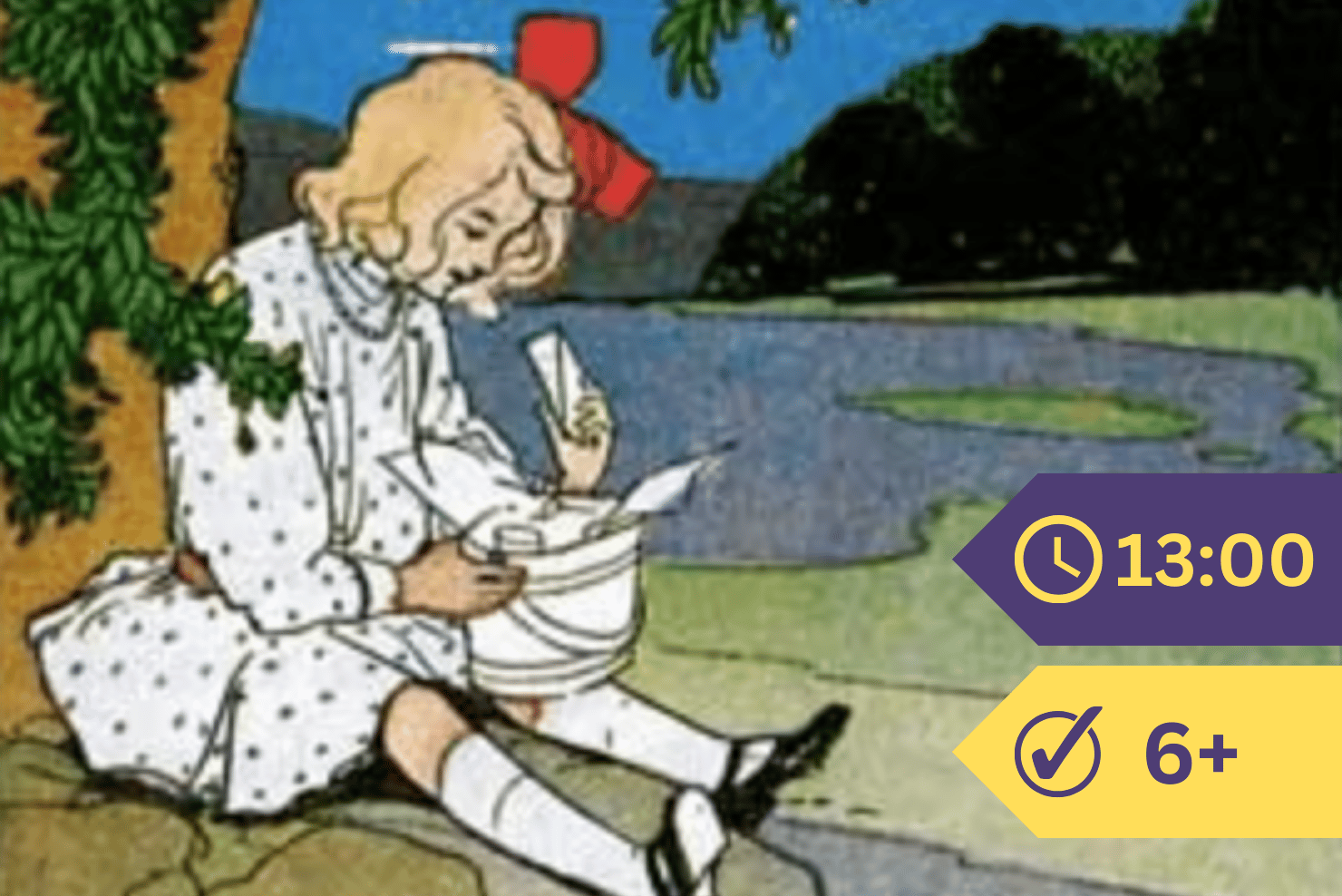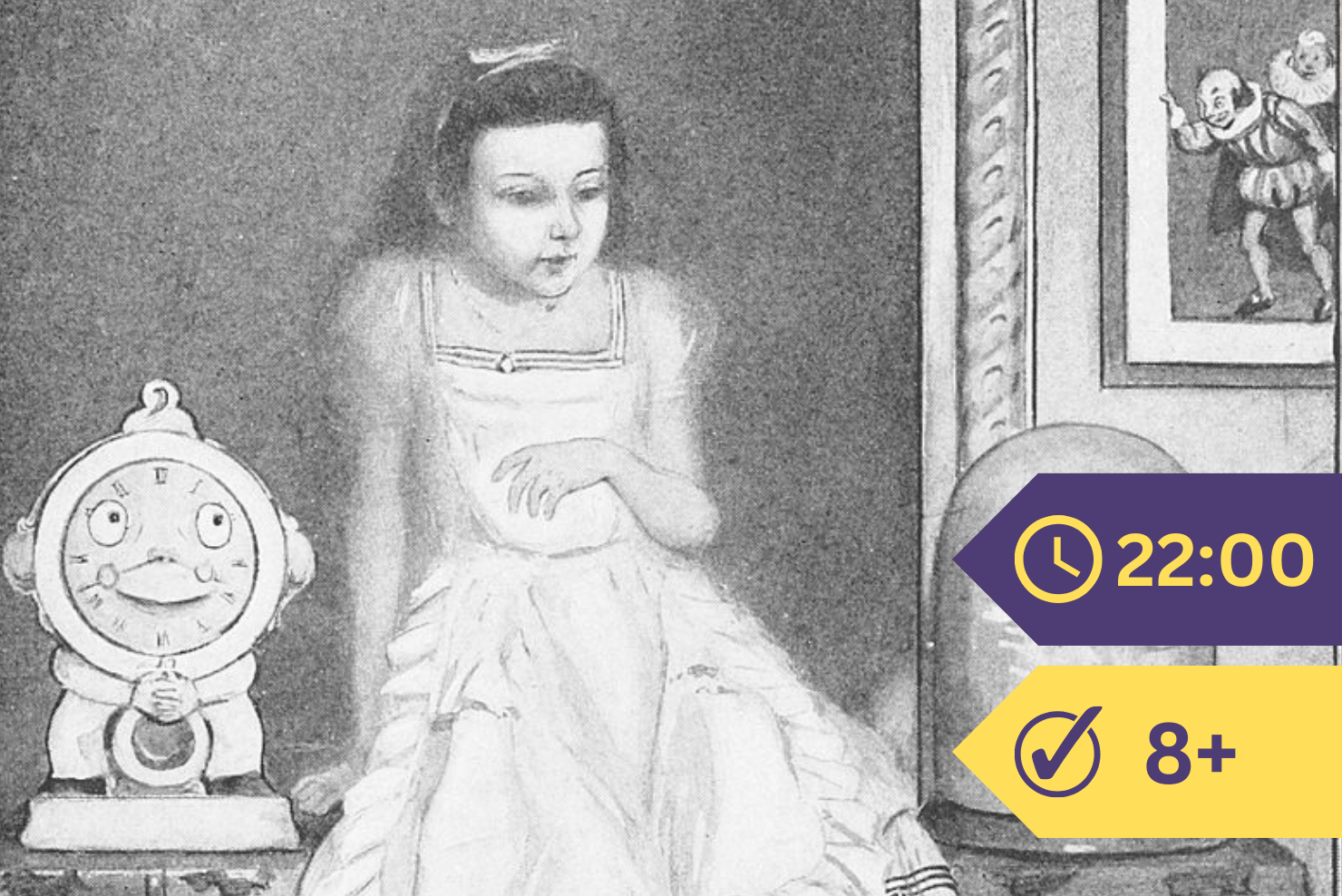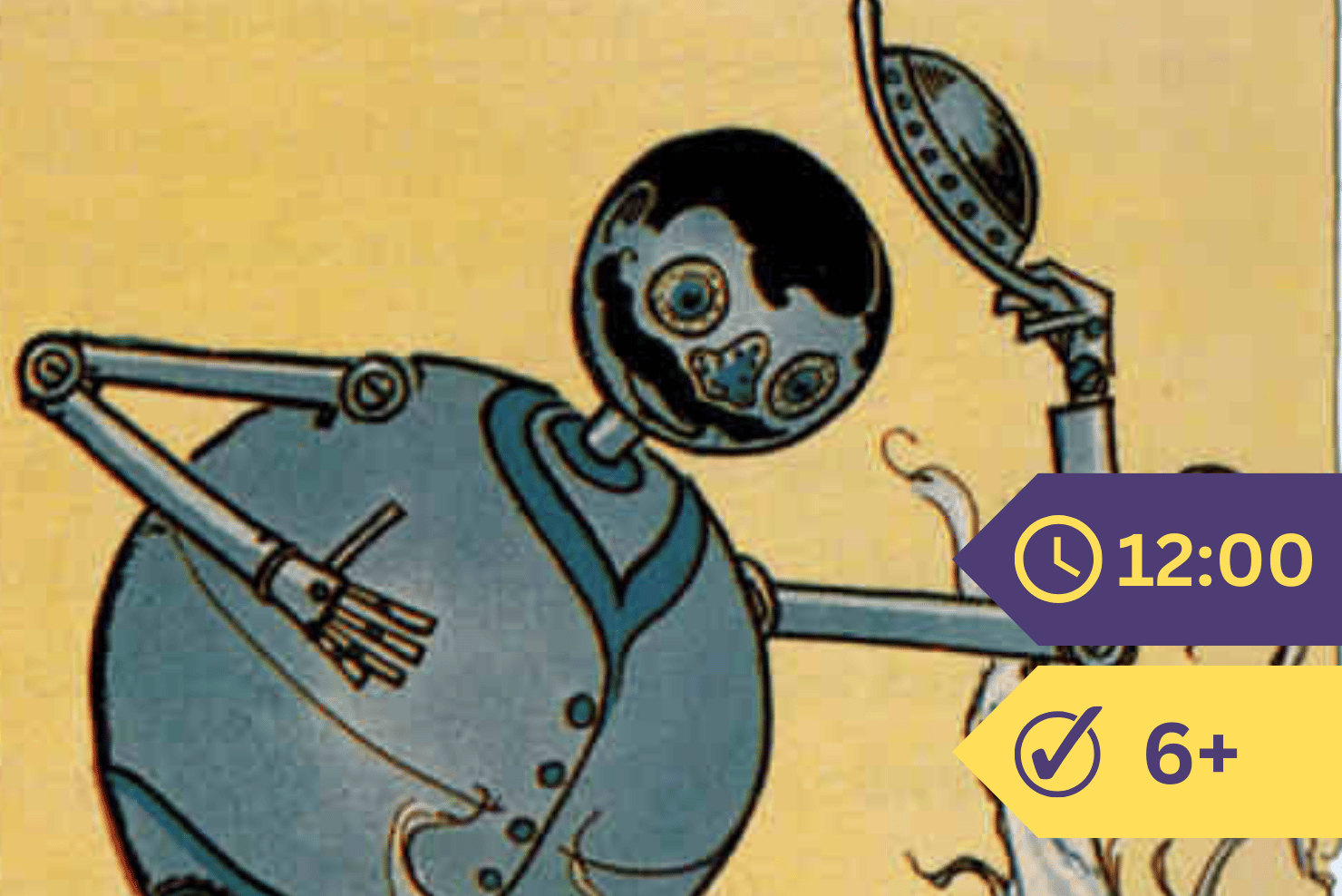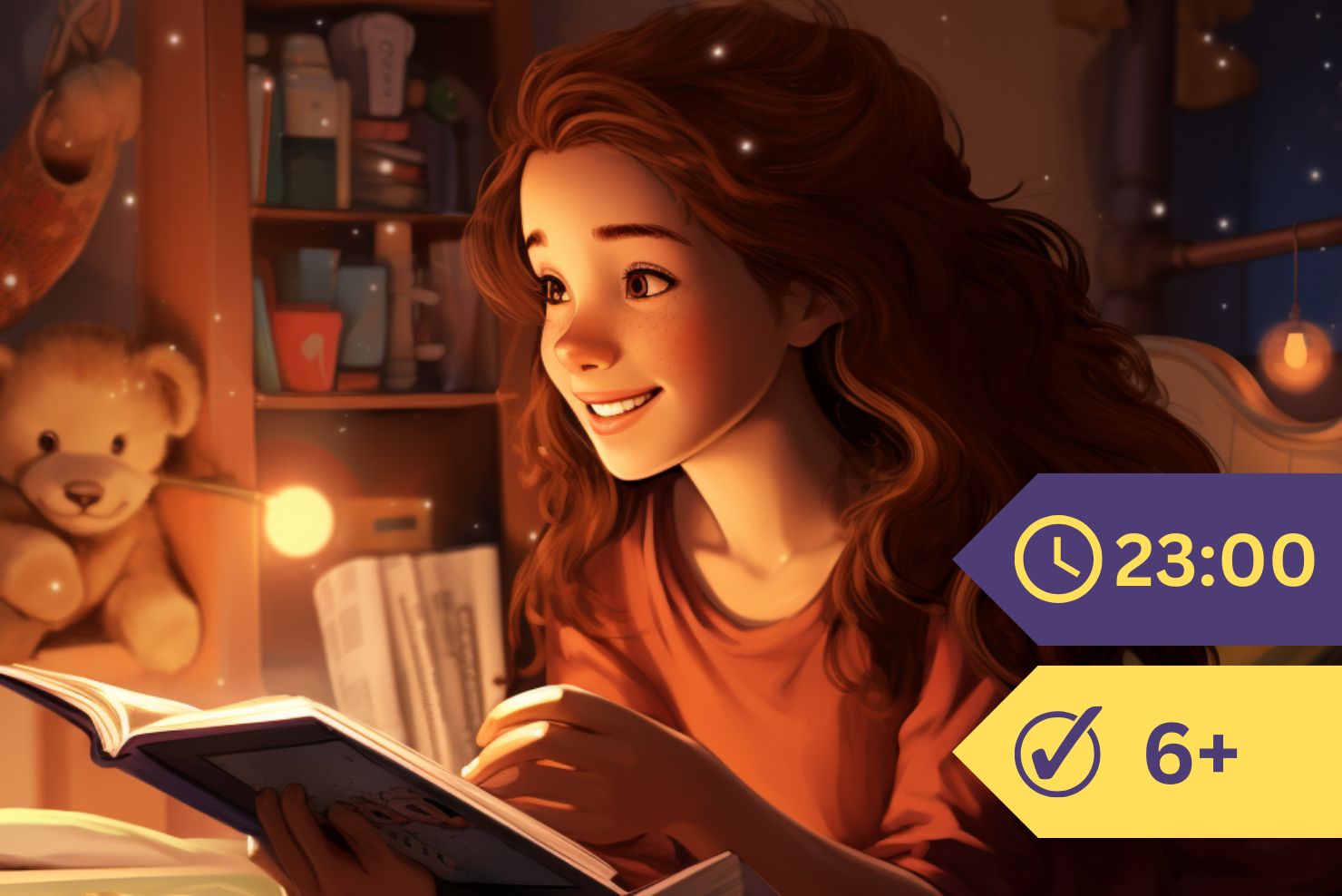After an hour or so most of the band of Wheelers rolled back into the forest, leaving only three of their number to guard the hill. These curled themselves up like big dogs and pretended to go to sleep on the sands; but neither Dorothy nor Billina were fooled by this trick, so they remained in security among the rocks and paid no attention to their cunning enemies.
Finally the hen, fluttering over the mound, exclaimed: “Why, here’s a path!”
So Dorothy at once clambered to where Billina sat, and there, sure enough, was a smooth path cut between the rocks. It seemed to wind around the mound from top to bottom, like a cork-screw, twisting here and there between the rough boulders but always remaining level and easy to walk upon.
Indeed, Dorothy wondered at first why the Wheelers did not roll up this path; but when she followed it to the foot of the mound she found that several big pieces of rock had been placed directly across the end of the way, thus preventing any one outside from seeing it and also preventing the Wheelers from using it to climb up the mound.
Then Dorothy walked back up the path, and followed it until she came to the very top of the hill, where a solitary round rock stood that was bigger than any of the others surrounding it. The path came to an end just beside this great rock, and for a moment it puzzled the girl to know why the path had been made at all. But the hen, who had been gravely following her around and was now perched upon a point of rock behind Dorothy, suddenly remarked:
“It looks something like a door, doesn’t it?”
“What looks like a door?” enquired the child.
“Why, that crack in the rock, just facing you,” replied Billina, whose little round eyes were very sharp and seemed to see everything. “It runs up one side and down the other, and across the top and the bottom.”
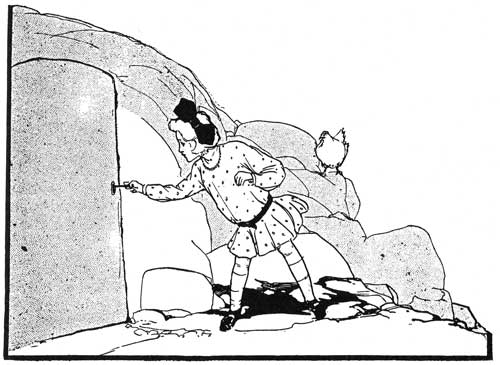
“What does?”
“Why, the crack. So I think it must be a door of rock, although I do not see any hinges.”
“Oh, yes,” said Dorothy, now observing for the first time the crack in the rock. “And isn’t this a key-hole, Billina?” pointing to a round, deep hole at one side of the door.
“Of course. If we only had the key, now, we could unlock it and see what is there,” replied the yellow hen. “May be it’s a treasure chamber full of diamonds and rubies, or heaps of shining gold, or——”
“That reminds me,” said Dorothy, “of the golden key I picked up on the shore. Do you think that it would fit this key-hole, Billina?”
“Try it and see,” suggested the hen.
So Dorothy searched in the pocket of her dress and found the golden key. And when she had put it into the hole of the rock, and turned it, a sudden sharp snap was heard; then, with a solemn creak that made the shivers run down the child’s back, the face of the rock fell outward, like a door on hinges, and revealed a small dark chamber just inside.
“Good gracious!” cried Dorothy, shrinking back as far as the narrow path would let her.
For, standing within the narrow chamber of rock, was the form of a man—or, at least, it seemed like a man, in the dim light. He was only about as tall as Dorothy herself, and his body was round as a ball and made out of burnished copper. Also his head and limbs were copper, and these were jointed or hinged to his body in a peculiar way, with metal caps over the joints, like the armor worn by knights in days of old. He stood perfectly still, and where the light struck upon his form it glittered as if made of pure gold.
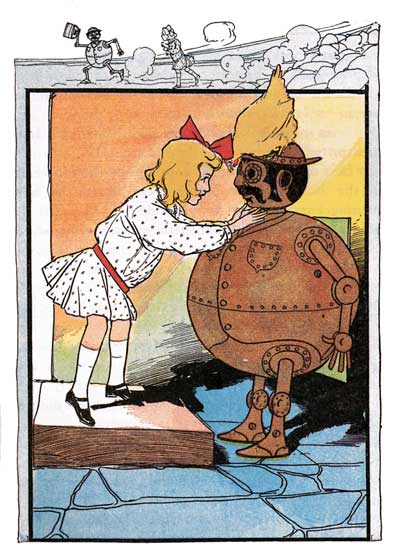
“Don’t be frightened,” called Billina, from her perch. “It isn’t alive.”
“I see it isn’t,” replied the girl, drawing a long breath.
“It is only made out of copper, like the old kettle in the barn-yard at home,” continued the hen, turning her head first to one side and then to the other, so that both her little round eyes could examine the object.
“Once,” said Dorothy, “I knew a man made out of tin, who was a woodman named Nick Chopper. But he was as alive as we are, ’cause he was born a real man, and got his tin body a little at a time—first a leg and then a finger and then an ear—for the reason that he had so many accidents with his axe, and cut himself up in a very careless manner.”
“Oh,” said the hen, with a sniff, as if she did not believe the story.
“But this copper man,” continued Dorothy, looking at it with big eyes, “is not alive at all, and I wonder what it was made for, and why it was locked up in this queer place.”
“That is a mystery,” remarked the hen, twisting her head to arrange her wing-feathers with her bill.
Dorothy stepped inside the little room to get a back view of the copper man, and in this way discovered a printed card that hung between his shoulders, it being suspended from a small copper peg at the back of his neck. She unfastened this card and returned to the path, where the light was better, and sat herself down upon a slab of rock to read the printing.
“What does it say?” asked the hen, curiously.
Dorothy read the card aloud, spelling out the big words with some difficulty; and this is what she read:
SMITH & TINKER’S
Patent Double-Action, Extra-Responsive, Thought-Creating, Perfect-Talking
MECHANICAL MAN
Fitted with our Special Clock-Work Attachment. Thinks, Speaks, Acts, and Does Everything but Live.
Manufactured only at our Works at Evna, Land of Ev. All infringements will be promptly Prosecuted according to Law.
“How queer!” said the yellow hen. “Do you think that is all true, my dear?”
“I don’t know,” answered Dorothy, who had more to read. “Listen to this, Billina:”
DIRECTIONS FOR USING:
For THINKING:—Wind the Clock-work Man under his left arm, (marked No. 1.)
For SPEAKING:—Wind the Clock-work Man under his right arm, (marked No. 2.)
For WALKING and ACTION:—Wind Clock-work in the middle of his back, (marked No. 3.)
N. B.—This Mechanism is guaranteed to work perfectly for a thousand years.
“Well, I declare!” gasped the yellow hen, in amazement; “if the copper man can do half of these things he is a very wonderful machine. But I suppose it is all humbug, like so many other patented articles.”
“We might wind him up,” suggested Dorothy, “and see what he’ll do.”
“Where is the key to the clock-work?” asked Billina.
“Hanging on the peg where I found the card.”
“Then,” said the hen, “let us try him, and find out if he will go. He is warranted for a thousand years, it seems; but we do not know how long he has been standing inside this rock.”
Dorothy had already taken the clock key from the peg.
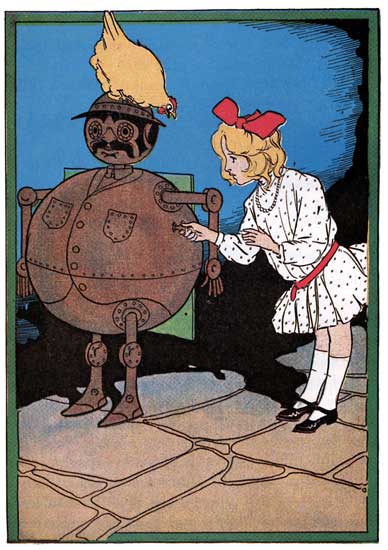
“Which shall I wind up first?” she asked, looking again at the directions on the card.
“Number One, I should think,” returned Billina. “That makes him think, doesn’t it?”
“Yes,” said Dorothy, and wound up Number One, under the left arm.
“He doesn’t seem any different,” remarked the hen, critically.
“Why, of course not; he is only thinking, now,” said Dorothy.
“I wonder what he is thinking about.”
“I’ll wind up his talk, and then perhaps he can tell us,” said the girl.
So she wound up Number Two, and immediately the clock-work man said, without moving any part of his body except his lips:
“Good morn-ing, lit-tle girl. Good morn-ing, Mrs. Hen.”
The words sounded a little hoarse and creakey, and they were uttered all in the same tone, without any change of expression whatever; but both Dorothy and Billina understood them perfectly.
“Good morning, sir,” they answered, politely.
“Thank you for res-cu-ing me,” continued the machine, in the same monotonous voice, which seemed to be worked by a bellows inside of him, like the little toy lambs and cats the children squeeze so that they will make a noise.
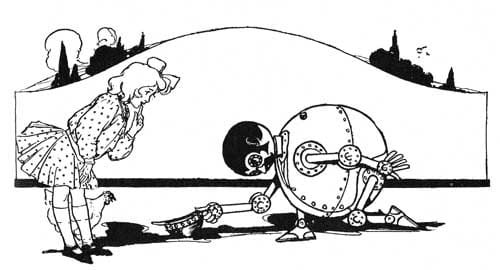
“Don’t mention it,” answered Dorothy. And then, being very curious, she asked: “How did you come to be locked up in this place?”
“It is a long sto-ry,” replied the copper man; “but I will tell it to you brief-ly. I was pur-chased from Smith & Tin-ker, my man-u-fac-tur-ers, by a cru-el King of Ev, named Ev-ol-do, who used to beat all his serv-ants un-til they died. How-ev-er, he was not a-ble to kill me, be-cause I was not a-live, and one must first live in or-der to die. So that all his beat-ing did me no harm, and mere-ly kept my cop-per bod-y well pol-ished.
“This cru-el king had a love-ly wife and ten beau-ti-ful chil-dren—five boys and five girls—but in a fit of an-ger he sold them all to the Nome King, who by means of his mag-ic arts changed them all in-to oth-er forms and put them in his un-der-ground pal-ace to or-na-ment the rooms.
“Af-ter-ward the King of Ev re-gret-ted his wick-ed ac-tion, and tried to get his wife and chil-dren a-way from the Nome King, but with-out a-vail. So, in de-spair, he locked me up in this rock, threw the key in-to the o-cean, and then jumped in af-ter it and was drowned.”
“How very dreadful!” exclaimed Dorothy.
“It is, in-deed,” said the machine. “When I found my-self im-pris-oned I shout-ed for help un-til my voice ran down; and then I walked back and forth in this lit-tle room un-til my ac-tion ran down; and then I stood still and thought un-til my thoughts ran down. Af-ter that I re-mem-ber noth-ing un-til you wound me up a-gain.”
“It’s a very wonderful story,” said Dorothy, “and proves that the Land of Ev is really a fairy land, as I thought it was.”
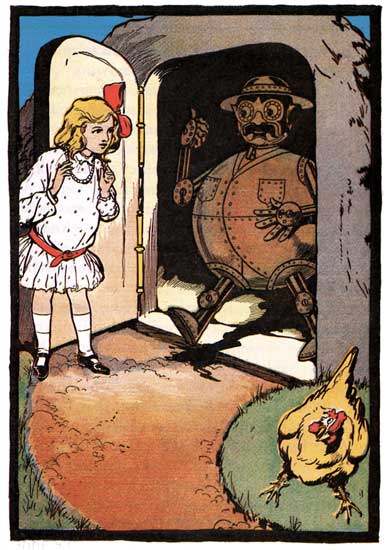
“Of course it is,” answered the copper man. “I do not sup-pose such a per-fect ma-chine as I am could be made in an-y place but a fair-y land.”
“I’ve never seen one in Kansas,” said Dorothy.
“But where did you get the key to un-lock this door?” asked the clock-work voice.
“I found it on the shore, where it was prob’ly washed up by the waves,” she answered. “And now, sir, if you don’t mind, I’ll wind up your action.”
“That will please me ve-ry much,” said the machine.
So she wound up Number Three, and at once the copper man in a somewhat stiff and jerky fashion walked out of the rocky cavern, took off his copper hat and bowed politely, and then kneeled before Dorothy. Said he:
“From this time forth I am your o-be-di-ent ser-vant. What-ev-er you com-mand, that I will do will-ing-ly—if you keep me wound up.”
“What is your name?” she asked.
“Tik-tok,” he replied. “My for-mer mas-ter gave me that name be-cause my clock-work al-ways ticks when it is wound up.”
“I can hear it now,” said the yellow hen.
“So can I,” said Dorothy. And then she added, with some anxiety: “You don’t strike, do you?”
“No,” answered Tiktok; “and there is no a-larm con-nec-ted with my ma-chin-er-y. I can tell the time, though, by speak-ing, and as I nev-er sleep I can wak-en you at an-y hour you wish to get up in the morn-ing.”
“That’s nice,” said the little girl; “only I never wish to get up in the morning.”
“You can sleep until I lay my egg,” said the yellow hen. “Then, when I cackle, Tiktok will know it is time to waken you.”
“Do you lay your egg very early?” asked Dorothy.
“About eight o’clock,” said Billina. “And everybody ought to be up by that time, I’m sure.”
